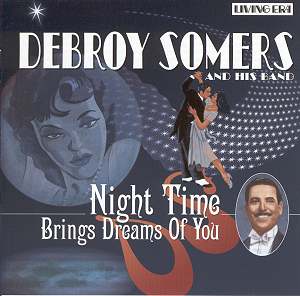1. Carolina Moon
2. Dixieland
3. Doll Dance
4. Elizabeth
5. Goodnight Lovely Little Lady
6. Irving Berlin Waltz Songs
7. Isn't It Romantic
8. Lover
9. Lucky Break
10. Mr And Mrs Is The Name
11. My Heart's To Let
12. Night Time Brings Sweet Dreams Of
You
13. Night When Love Was Born
14. Peanut Vendor
15. Red Roofed Chalet
16. Ro Ro Rolling Along
17. She Wore A little Jacket Of Blue
18. Tell Me I'm Forgiven
19. There's A New World
20. They All Start Whistling Mary
21. West End Nights
22. Stop Press
rec. 1927-36
Debroy Somers, elegant,
suave and a multi-instrumentalist, had
an important career in and out of the
recording studios. He made a few appearances
on film and was a long standing staff
arranger, as well as having been in
on the ground floor when English Vocalion
opened for business just after the First
World War. But he will be best remembered
for his band, a debonair if rather conventional
big outfit that recorded prolifically.
There weren’t any star
names in the band and it didn’t play
jazz or much jazz-influenced music.
That said Jock Fleming was the trombonist
and he was a fine player well remembered
by admirers of British dance band brass
players of the 1920s and 1930s. And
there was the very young violinist Jean
Pougnet, then a jobbing freelancer who
was also doing his stints with string
quartets; he formed part of the two-man
violin section on some of these tracks.
Later on he formed part of the greatest
ever British classical string trio and
made many memorable recordings as a
classical player.
But individual brilliance
wasn’t really part of the equation for
a Somers band. Film and show tunes were
a staple, medleys and Glamorous Nights
numbers, all served up with rather two-beat
old fashioned (even then I suspect)
arrangements. Staid, perhaps, and sometimes
rather corny. Some of the period vocals
are skin crawlingly awful – and the
xylophone and other percussive moments
lack the varnish of contemporary bands.
But more than most Somers insisted on
the string section taking an independent
sectional part in arrangements and he
was ever alert as to new changes in
dance rhythms and voguish new pieces.
We hear The Peanut Vendor for
example, though admittedly he seems
to have come from Shoreditch rather
than anywhere exotic, if the East End
vocals are anything to go by. Talking
of which, though Sam Costa turns up,
and though Webster Booth appears in
West End Nights – briefly – there
were no singers to compare with Denny
Dennis or Sam Browne or Al Bowlly. Dan
Donovan is really not among the elect.
Still, the rumba is well catered for
and the salutes to Richard Rogers’s
songs are well merited.
Transfers are good
as are the sleeve notes. If you want
a nostalgic slice of show band tunes
then Debroy Somers served up the fare,
though be prepared for some jellied
eels alongside the Hors d’oeuvres.
Jonathan Woolf
